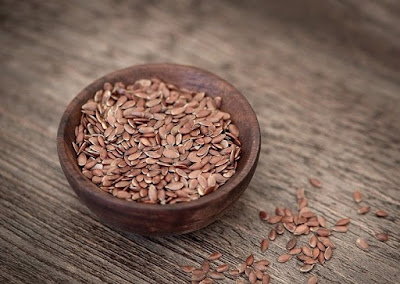Flax seeds also called linseed and ALSI in Hindi, are a rich source of micronutrients, dietary fiber, manganese, vitamin B1, and the essential fatty acid alpha-linolenic acid, also known as ALA or omega-3. The seeds come from flax, one of the oldest fiber crops in the world - known to have been cultivated in ancient Egypt and China.
Flaxseed is a source of healthy fat, antioxidants, and fiber; modern research has found evidence to suggest that flaxseed can also help lower the risk of diabetes, cancer, and heart disease.
King Charlemagne of the 8th century believed so strongly in the health benefits of flaxseed that he demanded his loyal subjects eat the seeds and passed laws to make sure of it. The Latin name for flax is Linum usitatissimum, which means "the most useful.
This MNT Knowledge Center feature is part of a collection of article on the health benefits of popular foods. To reap the most benefits from flax seeds, they should be bought in ground form or ground before consumption as whole flax seeds can sometimes pass through the digestive tract undigested.
Nutrition value of FlaxSeeds
Their nutritional value contains a number of short-chain omega-3 fatty acids with other things as given below
Flaxseeds are rich in:
Lignans
Lignans are one of the major classes of phytoestrogens. They are estrogen-like chemical compounds with antioxidant qualities, able to scavenge free radicals in the body. Flaxseed is considered to be one of the best sources of lignans (0.3 g per 100g). A study, published in the journal Critical Reviews in Clinical Laboratory Sciences, concluded that "lignan-rich diets may be beneficial, particularly if consumed for life."
Flaxseeds (also called linseeds) are a rich source of micronutrients, dietary fiber, manganese, vitamin B1, and the essential fatty acid alpha-linolenic acid, also known as ALA or omega-3.
Fiber
Flaxseed is rich in both soluble fiber (dissolves in water) and insoluble fiber (does not dissolve in water). According to Mayo Clinic3, soluble fiber dissolves in water and creates a gel-like substance that helps to lower blood cholesterol and glucose levels." Whereas insoluble fiber "absorbs water, which adds bulk to your digestive tract and helps to move things through quickly.
Omega-3 fatty acids
These are considered to be "good fats" that are beneficial for the heart. These essential acids are only obtainable by eating the right foods; the human body is not able to produce them. (R)
Health Benefits of FlaxSeeds
The therapeutic and beneficial properties of consuming flaxseed are not yet completely understood, and many claims still lack "high-quality" studies to back them up. However, emerging research suggests that flaxseed might indeed be the wonder food many people claim it to be.
The health benefits associated with flaxseed include:
Protects against cancer
Consuming flaxseed may help protect against prostate, colon, and breast cancers. Flaxseed is thought to prevent the growth of cancerous cells because its omega-3 fatty acids disrupt malignant cells from clinging to other body cells. In addition, the lignans in flaxseed have antiangiogenic properties - they stop tumors from forming new blood vessels. One US study presented at the 43rd annual meeting of the American Society of Clinical Oncology (ASCO) revealed that consuming flaxseed can stop prostate cancer tumors from growing. Dr. Wendy Demark-Wahnefried, lead investigator of the study said that the team was excited that this study showed that flaxseed is safe and associated with a protective effect on prostate cancer.
Lower cholesterol
Researchers at the Iowa State University's Nutrition and Wellness Research Center found that cholesterol levels lowered among men who included flaxseed in their diet. Suzanne Hendrich, a lead author of the study, said that for people who can't take something like Lipitor, this could at least give you some of that cholesterol-lowering benefit. (R)
Flax Seed Prevent hot flashes
A study published in the Journal of the Society for Integrative Oncology suggests that dietary intake of flaxseed can decrease the risk of hot flashes among postmenopausal women. "Not only does flaxseed seem to alleviate hot flashes, but it appears to have overall health and psychological benefits as well.
Flax Seed Improve blood sugar
There is strong evidence to suggest that consuming flaxseed every day improves glycemic control in obese men and women with pre-diabetes4, according to a study published in Nutrition Research.
Protecting against radiation
Flax Seed is a strong antioxidant and anti-inflammatory
A diet of flaxseed may protect skin tissue from being damaged by radiation, revealed researchers at the Perelman School of Medicine at the University of Pennsylvania. The investigators concluded that their "study demonstrates that dietary flaxseed, already known for its strong antioxidant and anti-inflammatory properties, works as both a mitigator and protector against radiation pneumonopathy.
Flax Seed Good for Skin and Hair
For healthier skin, hair and nails then consider adding flax seeds or flax seed oil to your daily routine. The ALA fats in flax seeds benefit the skin and hair by providing essential fats as well as b-vitamins which can help reduce dryness and flakiness. It can also improve symptoms of acne and eczema. This also applies to eye health as flax can reduce dry eye syndrome. Flaxseed oil is another great option since it has an even higher concentration of healthy fats hydrate skin and hair.
Constipation Treatment
You can pre-soak a tablespoon in a glass of water overnight to produce a very good concoction for constipation by drinking it in the morning. A good dose of fiber found in flaxseed helps to cleanse the intestine.
Flaxseed is full of good fats
Flaxseed is a potent source of omega-3 fatty acids, containing a 4:1 ratio of omega 3 to omega 6 fatty acids. This is a great way to balance out the predominant ratios in the Standard American Diet, which is so heavy in corn, canola, soy, and peanut oils, all of these have too much of omega 6 than omega 3.
Also, Read- Sunflower Seeds Benefits








No comments:
Post a Comment